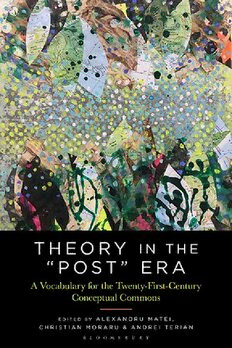Download Theory in the “Post” Era: A Vocabulary for the 21st-Century Conceptual Commons PDF Free - Full Version
Download Theory in the “Post” Era: A Vocabulary for the 21st-Century Conceptual Commons by Alexandru Matei; Christian Moraru; Andrei Terian (editor) in PDF format completely FREE. No registration required, no payment needed. Get instant access to this valuable resource on PDFdrive.to!
About Theory in the “Post” Era: A Vocabulary for the 21st-Century Conceptual Commons
Theory in the “Post” Era brings together the work and perspectives of a group of Romanian theorists who discuss the morphings of contemporary theory in what the editors call the “post” era. Since the Cold War’s end and especially in the third millennium, theorists have been exploring the aftermath – and sometimes just the “after” – of whole paradigms, the crisis or “passing” of anthropocentrism, the twilight of an entire ontological and cultural “condition,” as well as the corresponding rise of an antagonist model, of an “anti,” “meta,” or “neo” alternative, with examples ranging from “posthumanism” and “post-postmodernism” to “post-aesthetics,” “postanalog” interpretation or “digicriticism,” “post-presentism,” “post-memory,” “post-” or “neo-critique,” and so forth.It is no coincidence, the contributors to this volume argue, that this “post” moment is also a time when theory is practiced as a world genre. If theory has always been a “worlded” enterprise, a quintessentially communal, cross-cultural and international project, this is truer at present than ever. Perhaps more than other humanist constituencies, today’s theorists work and belong in a theory commons that is transnational if still uneven economically, politically, and otherwise. Theory in the “Post” Era reports the results of Romanian theory experiments that join efforts made in other places to foster a theory for the “post” age.
Detailed Information
| Author: | Alexandru Matei; Christian Moraru; Andrei Terian (editor) |
|---|---|
| Publication Year: | 2022 |
| ISBN: | 9781501358975 |
| Pages: | 377 |
| Language: | English |
| File Size: | 2.898 |
| Format: | |
| Price: | FREE |
Safe & Secure Download - No registration required
Why Choose PDFdrive for Your Free Theory in the “Post” Era: A Vocabulary for the 21st-Century Conceptual Commons Download?
- 100% Free: No hidden fees or subscriptions required for one book every day.
- No Registration: Immediate access is available without creating accounts for one book every day.
- Safe and Secure: Clean downloads without malware or viruses
- Multiple Formats: PDF, MOBI, Mpub,... optimized for all devices
- Educational Resource: Supporting knowledge sharing and learning
Frequently Asked Questions
Is it really free to download Theory in the “Post” Era: A Vocabulary for the 21st-Century Conceptual Commons PDF?
Yes, on https://PDFdrive.to you can download Theory in the “Post” Era: A Vocabulary for the 21st-Century Conceptual Commons by Alexandru Matei; Christian Moraru; Andrei Terian (editor) completely free. We don't require any payment, subscription, or registration to access this PDF file. For 3 books every day.
How can I read Theory in the “Post” Era: A Vocabulary for the 21st-Century Conceptual Commons on my mobile device?
After downloading Theory in the “Post” Era: A Vocabulary for the 21st-Century Conceptual Commons PDF, you can open it with any PDF reader app on your phone or tablet. We recommend using Adobe Acrobat Reader, Apple Books, or Google Play Books for the best reading experience.
Is this the full version of Theory in the “Post” Era: A Vocabulary for the 21st-Century Conceptual Commons?
Yes, this is the complete PDF version of Theory in the “Post” Era: A Vocabulary for the 21st-Century Conceptual Commons by Alexandru Matei; Christian Moraru; Andrei Terian (editor). You will be able to read the entire content as in the printed version without missing any pages.
Is it legal to download Theory in the “Post” Era: A Vocabulary for the 21st-Century Conceptual Commons PDF for free?
https://PDFdrive.to provides links to free educational resources available online. We do not store any files on our servers. Please be aware of copyright laws in your country before downloading.
The materials shared are intended for research, educational, and personal use in accordance with fair use principles.

